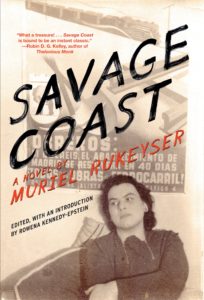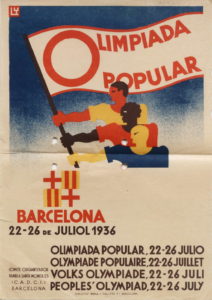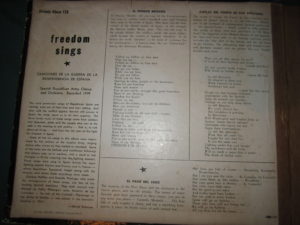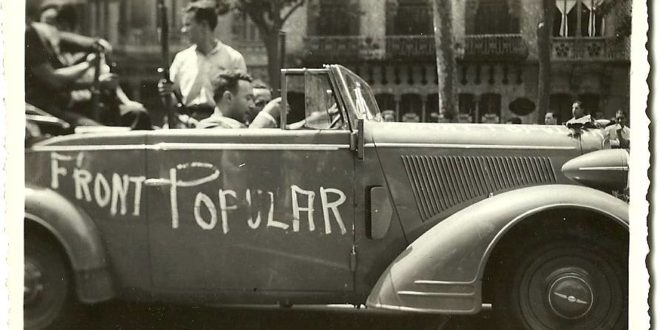Podcast: Play in new window | Download (Duration: 59:00 — 81.0MB)
 In 1936, twenty-two-year-old Muriel Rukeyser, who had just won the Yale Younger Poets Award for her first book Theory of Flight, was suddenly (almost accidentally) in Spain as a journalist to cover the Olimpiada Popular, or People’s Olympiad, a protest event against the 1936 Berlin Olympics presided over by Hitler and the Nazi Party. Intended to take place in Barcelona, the capital of the autonomous region of Catalonia, the People’s Olympiad was never held due to the outbreak of the Spanish Civil War.
In 1936, twenty-two-year-old Muriel Rukeyser, who had just won the Yale Younger Poets Award for her first book Theory of Flight, was suddenly (almost accidentally) in Spain as a journalist to cover the Olimpiada Popular, or People’s Olympiad, a protest event against the 1936 Berlin Olympics presided over by Hitler and the Nazi Party. Intended to take place in Barcelona, the capital of the autonomous region of Catalonia, the People’s Olympiad was never held due to the outbreak of the Spanish Civil War.
Rukeyser was only in Spain from July 19th through the 24th but it was an experience that would inform her thinking and writing for the rest of her life. And though she wrote about it often and in several forms and genres, that experience is most fully related in her “lost novel” Savage Coast, and it can be seen as a key to so much of her subsequent work.
Today’s guest, Rowena Kennedy-Epstein, describes Savage Coast as a young woman’s political and sexual awakening imbued with the anarchist spirit of the moment; it’s messy, strange, and psychological. Rukeyser begins living and writing in ways that will expose the authoritarian nature of gendered oppression while asserting that sexual liberation is radical and anarchistic. In every way, Muriel Rukeyser and her art came to embody antifascism.
 Our opening song is “El pendón morado” performed here by Coro Popular Jabalón and recorded in 1977. An old war-song of those fighting to restore the Spanish Constitution of 1812 which had been abolished by Ferdinand VII, it was a popular song of Republican Spain during the civil war that began in 1936, a so-called “dress rehearsal” to World War II.
Our opening song is “El pendón morado” performed here by Coro Popular Jabalón and recorded in 1977. An old war-song of those fighting to restore the Spanish Constitution of 1812 which had been abolished by Ferdinand VII, it was a popular song of Republican Spain during the civil war that began in 1936, a so-called “dress rehearsal” to World War II.
Muriel Rukeyser tells us “this was the song of the purpler banner, the soldier’s guide, the good citizen, which became the symbol of Spanish Liberation. In its chorus the word ‘servilon’ is the term of contempt for the reactionaries — a historic term like our ‘lobsterback’ during the American Revolution,” the derogatory term for Redcoat.
We begin, perhaps surprisingly (perhaps not), with Orson Welles, and be sure we will find our way to Herman Melville in the end as well.
 GUEST
GUEST
Rowena Kennedy-Epstein, a Lecturer in Gender and Women’s Writing of the 20th and 21st Centuries at the University of Bristol and editor of the 2013 edition of Muriel Rukeyser’s Savage Coast. She’s completing a manuscript titled My Unfinished Spirit: Muriel Rukeyser between Archive and Authorship that is forthcoming from Cornell University Press.
RELATED
Recovering Muriel Rukeyser’s Savage Coast by Rowena Kennedy-Epstein
The Spirit of Revolt: Women Writers, Archives and the Cold War by Rowena Kennedy-Epstein
Out of a Brick Throat: How Poets and Poetry Matter (Interchange on Left Poetry with Sarah Ehlers)
Ears to Hear: Orson Welles in Brazil (Interchange with Catherine Benamou)
Just a Spoonful of America: Prescribing American Studies to Fight Fascism (Interchange with George Blaustein)
The Unknown Knowns of Cultural Diplomacy (Interchange with Juliana Spahr)
MUSIC
 “El pendón morado” performed by Coro Popular Jabalón
“El pendón morado” performed by Coro Popular Jabalón
“St. Louis Blues” performed by Bessie Smith with Louis Armstrong on coronet (1925)
“Alone” from A Night at the Opera, by Maurice Winnick & His Orchestra, vocal by Sam Costa (1936)
“El Trágala” performed by Coro Popular Jabalón
CREDITS
Producer & Host: Doug Storm
Executive Producer: Kade Young
 WFHB Bloomington Community Radio
WFHB Bloomington Community Radio


